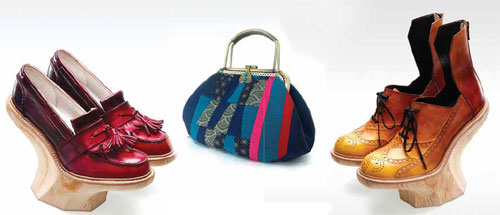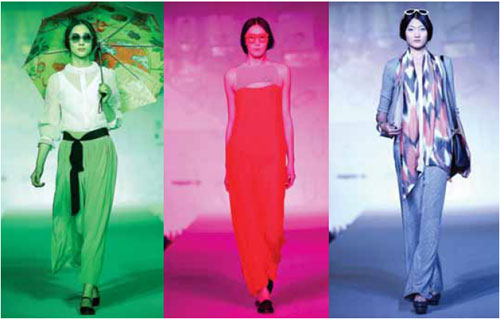Old elements new designs

 |
|
Above: Brand New China displays its 2012 Spring/Summer Collection with traditional Chinese fashion elements. Top: Handbag designed by Li Wei and shoes by Kim Kiroic, both designers of BNC. Photos by Zou Hong / China Daily and Provided to China Daily |
A group of designers has given a new interpretation of China's rich heritage. Chen Nan finds out their unique style.
When Brand New China (BNC), a two-year-old fashion store selling Chinese designs in Beijing, paraded its 2012 Spring/Summer Collection on the runway, accessory designers in China, long considered as unsung heroes, stood out.
Through their contemporary take on classic designs, most of them reflected the rich heritage of the country.
For 32-year-old handbag designer Li Wei, who started her business in 2010, this is the appropriate season to showcase her brand - 37C Handmade.
"I love buying bags before I started my own business. But I realized that branded bags and those without brands have similarities in either colors or designs. So I decided to do something different, which cannot be copied," she says.
From small dumpling-shaped purse to mid-sized rectangular handheld bag and magazine-sized triangle bag, Li's designs complimented the futuristic and avant-garde clothes donned by the models.
The Suzhou native read human resources in college, furthered her study in fashion design, and worked full time as an independent designer after graduation. She borrows the elements of traditional Chinese clothes to develop her own style.
Li uses all kinds of texture such as embroidery, brocade, linen and silk, decorate with colorful beads, brass buttons and leather chains. Her various designs are suitable for different occasions.
Like many girls, who are fascinated about traditional Chinese fashion elements, such as qipao and other accessories, Li loves the unique Chinese heritage and ancient fashion.
"I have bought clothes from international brands, but my favorite pieces are those with Chinese flavor," she says.
Choosing fabrics for each bag determines the shape and style, according to Li. Thanks to her hometown, which is known for silk and other fabrics, Li has a huge choice of resources.
"Choosing fabrics is the starting point of my design and it's an enjoyable experience for me," she says.
Her store in Nanjing carries bags for young and middle-aged women. Each design has a limited number of pieces to ensure uniqueness. Priced from 100 yuan ($15.80) to 1,000 yuan, Li hopes to bring high quality, affordable women's fashion to shoppers.
Li already had a regular crowd of clients in Nanjing when she was introduced to BNC by one of her customers at the end of 2011. She later signed on as one of BNC's Chinese designers.
"BNC is in Beijing, which opens a new window for me and offers me more opportunities," she says.
Li has since released her scarf series, which bear the same design approach as her bags. "I am not too ambitious and don't aim to go international. It would already be wonderful to have more Chinese women love my design," she says.
Kim Kiroic, 28, also incorporates lots of traditional Chinese fashion elements in his latest design. But unlike Li, the Shanghai-based designer has already built his shoe brand, Kiroic, at the forefront of the footwear industry in China.
He has also entered international stage by marching down the runway at Paris Fashion Week and collaborated with international fashion designers.
In his latest design displayed at BNC's catwalk, Kiroic was inspired by the late Qing Dynasty's (1644-1911) "flower bowl shoes", which sit on a high platform generally made of wood, or had a small central pedestal.
The designer transformed the ancient footwear with bright colors, a variety of fabrics, and trendy shoe styles, such as short boots, re-designed high heels and sport shoes.
After leaving his job in Reebok in 2006, Kiroic spent two years creating his own studio and preparing for the launch of his high fashion sneaker brand.
The experiences he gained in product management and marketing from working for Reebok proved to be a boon in planning his own business.
The debut of Kiroic's highly-stylized, sandal-sneaker hybrids, attracted style-hungry Chinese buyers.
"I like putting different elements together to create a new look and I like mixing the past with the future," he says.
The same kind of inspiration, one which combines old and new, is also reflected in designer Huang Yichuan's jewelry collection. Underlying her designs is the traditional blue-and-white Chinese porcelain called qinghuaci.
"It is important for me to make a statement with my jewelry, which is - you can be trendy with a Chinese touch," Huang says. "I have seen a lot of Western jewelry brands opening chain stores in China, so why can't our own designers?"
As the designers' masterpieces are rare and exquisitely handmade, Kiroic's footwear and Huang's jewelry are priced at over 1,000 yuan.
"The prices are determined by the designers and most of them believe in 'slow' design methods, which not only guarantee the quality but also avoid over-production," says Hong Huang, CEO of China Interactive Media Group, which owns iLook magazine, a local fashion and lifestyle publication.
"The future is bright for Chinese designers who dare to experiment with their new ideas," she says.
Contact the writer at chennan@chinadaily.com.cn.






















